"I'm so overexposed, I make Paris Hilton look like a recluse. I figure there's nowhere to go from here but down." - Illinois Sen. Barack Obama, talking about his improbable rise in the American political consciousness.
"We're angry. We want the shots." - Dalenda Corozon of Georgia, in reaction to a shortage of flu shots.
"You see those shingles over there? Charley did that. You see this tar paper over here? That's Frances." - Henry Seay of Florida, pointing out the back-to-back hurricane damage.
"His father went to the store. The tsunami hit and he never came back." - Crystal Lake monk Sujatha Peradeniye, relating the human destruction of earthquake-produced tsunamis at year's end in Southeast Asia.
"Now, today, the Ukrainian people have won. I congratulate you." - Viktor Yushchenko, after surviving attempts to poison him and prevailing to win the presidency of the Ukraine in his nation's third presidential election.
"We learned about an enemy who is sophisticated, patient, disciplined and lethal ... its hostility toward us and our values is limitless. Its purpose is to rid the world of religious and political pluralism, the plebiscite and equal rights for women." - The 9/11 Commission Report, on those who attacked America on Sept. 11, 2001.
"I don't know too many people who have the opportunity to do what they enjoy doing and to give their lives while doing it. If every mother said, 'No, don't go,' who'd be there?" - Georgette Frank, mother of Marine Lance Cpl. Phillip E. Frank of Elk Grove Village, who died in Iraq on April 8.
ahahaha... j'ai appris l'art d'optimisme. je ne simplement peux pas rester sombre pour très long, sourtout quand thai cuisine est pour la dine. non - je ne peux pas rester sombre pour très long parce qu'il y a beaucoup de m'égarer, et je suis facilement amusé.
salut! ;-)
mais, moi french est très mal! bring on aunt josephine!!! ahahahahaha -
after making the various calculations in my head stop for a moment - like, of course there will be anti-semitism involved in this charade; indonesia, sri lanka, thailand, india and the maldives aren't predominantly christian or jewish after all - i suggested she send money to the red cross or other bigger organizations who you can trust will use the money to help victims no matter what.
"no," she said, "because we don't have control over who gets the money. we don't want our money helping anti-semite victims. my husband saw this over the internet and on t.v. now some of us are upset. so you don't know anything about this, then?"
escape route, thank you, but wish i was quick and brave enough to ask her why does this matter. "i'm sorry."
"thank you," she said, resigned, and we hung up.
right now it doesn't matter where aid comes from - it will be a drop in the bucket required to even get clean water running in these poor areas again. her family is doing the right thing by being conscious of the disaster - too conscious, i think, paying attention to minutiae such as this. chances are, with the extent of damage, her help might not even leave the shores of the u.s. - it might go the red cross' administration costs.
as sure as the sun sets this afternoon, allah and jehovah aren't very happy.
Jan. 9
2 p.m. to 10 p.m.+
31 E. Balbo
Chicago IL 60605
www.hothouse.net
If you are willing to perform, please contact: Timothy Bisig, Program Director, HotHouse/CIPEX: p312.362.9707 x205, f312.362.9708, timothy@hothouse.net.
CNN recently featured a family in an island group in the indian ocean, off the coast of thailand, belonging to that nation. the reporter described how aid workers had to enlist the help of recipients to unload their plane full of provisions; that's how much help is needed, they're short even of volunteers. the families then will board the empty plane to move to the city. hopefully they will find work and a chance to start life there. the sea has swallowed their life on the island.
or perhaps volunteers are overflowing and centers haven't yet started fully organizing efforts. the cities are scrambling to catalogue, line up, identify, list, dig graves, and build coffins for, bury or burn the dead. not all coastal areas are tourist spots - most of them will be remote small towns that are virtually inaccessible but by dirt road or boat. there are bulletin boards for the missing, western faces smile from posters assembled as if shortly after the sept. 11, 2001 new york terror attacks. there are worries of cholera outbreaks and disease flourishing. there are concerns of finding whole towns dead, festering under the hot sun.
the news then turned to banda aceh province in indonesia, nearest the earthquake's epicenter. my sister studied abroad for a time in amsterdam. "what about the dutch? are they sending aid to their former colony?"
"maybe their aid's merged with the european union's contribution," my other sibling said.
"indonesia's situation is pretty much the same as ours - when something happens to us, spain doesn't rush over to help out. we're completely cut off," i said. i didn't bother to mention about the u.s. the u.s. continues to wreck havoc on the world in strange ways that are beyond my capacity to explain sometimes.
the u.s.' influence on the world could be compared to the tsunami - so powerful, that when it slams into you, you are left with almost nothing.
nature does as she will. said an indian village leader to a london reporter, "it is the will of nature and of the lord. they work in mysterious ways. but do not worry, the people will recover. they must. life will go on. it is cruel, terrible, but life is terrible everywhere, is it not?" sometimes when you're beholden such grace amid tragedy, all you can offer are witness and affinity.
---
Bush announces 4-nation aid coalition [ The Baltimore Sun ]
The latest in damage control.
---
'The water kept rising -- and rising'
by Gemunu Amarasinghe
Associated Press Writer
Posted online by The Minneapolis-St. Paul Star Tribune
Dec. 27, 2004
AMBALANGODA, SRI LANKA (AP) -- The twisted limbs of the frail girl in a blue dress were caught in a garden fence by the sea. She may have been dead already, but no one stopped to check. There was too much tragedy going on all around, as the water kept coming.
Before the waves hit southern Sri Lanka, I had gone to the seaside to drop off my parents at the shrine in Ambalangoda for a Buddhist ceremony. Sunday was the "Poya," or a full-moon day. We Buddhists believe that Buddha was born, attained enlightenment and died on a full-moon day, so they are a time for reflection.
As I was driving back to the capital, Colombo, I got a message on my cell phone that some parts of coastal Sri Lanka had been hit by unnaturally big waves.
I didn't need the message. People were running everywhere, and the first waves hit the road. They were not huge, not too destructive. They brought fish to the shore, and people rushed to collect them. [ more ]
---
Our Planet, and Our Duty
By Bob Herbert
Columnist, The New York Times
Dec. 31, 2004
One moment the kids were laughing and skylarking on the beach, yelling and chasing one another, sweating in the warm bright sun. The next moment they were gone.
The world is used to horror stories, but not on the stupefying scale of the macabre tales coming at us from the vast and disorienting zone of death in tsunami-stricken southern Asia. Einstein insisted that God does not play dice with the world, but that might be a difficult notion to sell to some of the agonized individuals who have seen everything they've lived for washed away in a pointless instant. [ more ]
---
Are We Stingy? Yes
The New York Times, Dec. 30, 2004
The controversial editorial given 30 minutes' panel on CNN, Dec. 31, for its proffers.
President Bush finally roused himself yesterday from his vacation in Crawford, Tex., to telephone his sympathy to the leaders of India, Sri Lanka, Thailand and Indonesia, and to speak publicly about the devastation of Sunday's tsunamis in Asia. He also hurried to put as much distance as possible between himself and America's initial measly aid offer of $15 million, and he took issue with an earlier statement by the United Nations' emergency relief coordinator, Jan Egeland, who had called the overall aid efforts by rich Western nations "stingy." "The person who made that statement was very misguided and ill informed," the president said.
We beg to differ. Mr. Egeland was right on target. We hope Secretary of State Colin Powell was privately embarrassed when, two days into a catastrophic disaster that hit 12 of the world's poorer countries and will cost billions of dollars to meliorate, he held a press conference to say that America, the world's richest nation, would contribute $15 million. That's less than half of what Republicans plan to spend on the Bush inaugural festivities. [ more ]
---
Asia, united by grief, remains free of any Western-style recrimination
The London Telegraph
Editorial, Dec. 31, 2004
Reprinted and posted online in The Sydney Morning Herald.
There is universal acceptance that nature is cruel and that life must go on, writes Mihir Bose.
As the death toll continued to rise in the worst disaster to hit South Asia for 40 years, I sat on a sand dune in Rajasthan's Thar desert, 2000 kilometres away, and asked a village leader what he thought of this calamity.
He said: "Sir, it is the will of nature and of the Lord. They work in mysterious ways. But do not worry, the people will recover. They must. Life will go on. It is cruel, terrible, but life is terrible everywhere, is it not?"
If this sounds strangely passive to a Westerner, bear in mind that he spoke with a great deal of quiet dignity. He went on to remind me that not long ago there was an earthquake in the neighbouring state of Gujarat which killed many people, and that his own region - always parched - had a dreadful drought 25 years ago, bringing death and destruction from which the land has recovered so well that it is now a noted tourist attraction.
Living with capricious, cruel nature is something most people in South Asia have long had to come to terms with. It helps that religion is so much part of their everyday lives, be they Hindus, Muslims, Christians or Buddhists.
It also helps that, in times of terrible tragedy, grief is openly expressed in all its raw, brutal form. The television screens have been filled with images of women beating their breasts as they mourn loved ones, or of fathers wailing as they identify a child snatched from them by an inexplicable phenomenon.
The images are shocking but they must also, in a way, be cathartic.
Western television has shown images of the dead in a less stark fashion than Indian television, as if viewers need protection from human grief. Indian television clearly feels viewers have no need of such nannying.
But this tragedy is also showing how the region is changing. The very nature of the disaster has brought home to people how closely related they are to each other. The epicentre was in Indonesia; the quake's shockwaves spread to Thailand, Sri Lanka and India and as far as the eastern seaboard of Africa.
One particularly terrible image was of people strolling along the beach in the southern Indian state of Tamil Nadu. They had heard of the earthquake in Indonesia, could not imagine it would have any effect on them and then suddenly saw the sea rising as if the world were coming to an end.
For various historical reasons - and reflecting the long European dominance of this part of the world - the countries affected by this tragedy have their sights trained on lands far away rather than on their neighbours. So Indonesia and Thailand look to Australia while India and Sri Lanka still look to Britain - indeed the Sri Lankan President, Chandrika Kumaratunga, was on her way back from London when this tragedy struck.
Now these countries are beginning to realise nature has bound them together and, if this is a cruel way to learn this lesson, it is still an important lesson.
The other big difference from previous tragedies that have afflicted this region is that it is probably the first one to be beamed into millions of South Asian sitting rooms by television. The small screen is bringing home the suffering in a way unprecedented in any previous disaster.
Also, the catastrophe has come in the middle of the great holiday season. December is often the best month in this part of the world. Although Christmas is not celebrated as in the West, schoolchildren are on holiday and, with growing prosperity, there is a lot of internal tourism, increasingly greater than the number of Western tourists.
This means that, in comparison with past disasters, this one has not been confined to just one bit of the region, neither in terms of impact nor in its coverage. To an extent, this is the first cataclysmic tragedy in which the entire region is a shocked spectator.
As happens in the West, this tragedy will lead to calls for greater accountability and questions about why the region does not have a better early warning system.
There was an hour and a half between the earthquake in Indonesia and the first onslaughts to hit Sri Lanka and India. Had these countries been on the list at the Pacific Ocean's tsunami warning centre, which covers 26 countries, there might have been some action taken to mitigate the effects.
In the absence of this, and given the poor infrastructure of the region, the people have been forced to fall back on their own resources and have shown exemplary courage and initiative.
For the moment, though, there is none of the anger and finger-pointing that would have become quickly evident in the West. Instead there is an acceptance that nature is cruel and life must go on.
daven (11:10:20 PM): who's there?
ulanmaya (11:10:28 PM): who?
daven (11:10:40 PM): amp
ulanmaya (11:10:47 PM): anong amp?
daven (11:10:47 PM): er... ahmp
ulanmaya (11:10:52 PM): ahmp?
daven (11:10:58 PM): ahmp who? (i'm poo)
daven (11:10:59 PM): HAHAHa
daven (11:11:00 PM): i dunno
ulanmaya (11:11:06 PM): AHAHAHAHA
THREE DAYS!!! weeeeee... like the steady spill of hourglass sands. a lot has happened to me in 2004. i must count them before i run out of time.
i wanted to comment on the haloscan of someone else's blog entry, but decided that spilling black pearls is much more appropriately done in my own space.
i wanted to agree that i can't wait for 2004 to be over... that it was bad from start to finish... but then again the same could be said of my 2003 and 2002. HA!
i wanted to agree that yes, if only in travel, the fates were kind to me. but then again, i'd go that the fates had only been kind coz i finally took chances and made the impossible leaps across bridgeless cliffs.
if i get ONE meaningful THING accomplished this coming year, 2005, i will be very happy. finally. like really happy, the type that steals on you suprisingly, randomly, making you smile to yourself.
it's a sign.
"i'm taking the last of this!" i announced, and walked away. everyone snapped awake and stopped what they were doing.
"all of it?"
"there's two inches left!"
"uh ha! one for you, another for me."
"no!"
i popped the chocolate into my mouth. almonds and creamy milk chocolate. mmm. thank heaven and earth for colonialism, slavery, indentured service, capitalism, and the evolution of cocoa and sugar. gone, all too soon, but perpetuated and perfected as evidenced in this rich alpenvollmilch-nuss bar, 300 grams.
covered by the golden aluminum foil are six more squares, about 1.5 by three inches of chocolate and almonds. oops. ahahahaha. after that grand announcement, i can't share the chocolate now. i am so in trouble. tomorrow i need to bring back a bar of my own.
thanks also to everyone who texted me!!! :-D i learned that my cell somehow can't text back, so that's why my greeting's a mere blogspot entry. i'll make it up on new year's day!
my family and i just returned from a trip out of town. will post pix up soon. hope your christmas year's the warmest one yet!
robert d w higley, 29, is a white male. that's all the information they will provide. maybe he'd just graduated from graduate school and started his first full-time job, a job he can finally call real, up in one of the two towers. maybe he was a mere intern, since jobs were beginning to get scarce by the end of the 2001 economic slump. maybe he was a mere cleaner assigned to five top floors every night.
we receive faxes from the nyc medical examiner's office because this office used to staff the "victims desk," a team of four reporters and one supervisor whose job it was to compile, check and verify the names of more than 3,000 victims of the three crash sites. ours is one of several lists maintained by media (cnn, the nashville tennessean and the new york times have lists), businesses (cantor-fitzgerald, who lost over 600 employees, has maintained one), insurance companies, hospitals, embassies, and city medical examiner offices.
family members called in to the office to ask whether their relatives' names were in our list. one such woman wanted to know if her brother was in ours. i remember her calling several other places, sobbing, pausing, breathing, and soldiering on to tell me she was looking for her brother. i walked over to the reporter to ask if they had this name in their lists - dead, missing, found. he was missing.
"thank you," she said, her breathing becoming stronger and easier. this means she can keep on looking. i learned then that there are some things you want to stay cloaked so that you can buy yourself time to recover.
"i hope you find him," was all i could say. time, the kindest weapon. i learned about that then, too.
i replaced the phone receiver. i walked over to the same reporter and asked if a name were in any of their lists. it was. it was early october. my colleague turned clipped but not emotionless. "this means that the family has already claimed insurance and signed a death certificate with the medical examiner's office," she said.
i logged on to the tennessean's victims database: jayceryll de chavez, 25. asian male. verified dead, oct. 4. he moved to new jersey long before my high school class graduated. time magazine featured a missing persons poster of him in a tuxedo. i forgot what bank company he was financial analyst for. i didn't know whether to call his sister and offer condolences. "please pray that they find him," was the last thing she asked, in a confident voice, late in september.
it has been three years, three months and 10 days since the sept. 11, 2001 terror attacks. time holds in check many things.
---
The Names
by Billy Collins
Yesterday, I lay awake in the palm of the night.
A soft rain stole in, unhelped by any breeze,
And when I saw the silver glaze on the windows,
I started with A, with Ackerman, as it happened,
Then Baxter and Calabro,
Davis and Eberling, names falling into place
As droplets fell through the dark.
Names printed on the ceiling of the night.
Names slipping around a watery bend.
Twenty-six willows on the banks of a stream.
In the morning, I walked out barefoot
Among thousands of flowers
Heavy with dew like the eyes of tears,
And each had a name --
Fiori inscribed on a yellow petal
Then Gonzalez and Han, Ishikawa and Jenkins.
Names written in the air
And stitched into the cloth of the day.
A name under a photograph taped to a mailbox.
Monogram on a torn shirt,
I see you spelled out on storefront windows
And on the bright unfurled awnings of this city.
I say the syllables as I turn a corner --
Kelly and Lee,
Medina, Nardella, and O'Connor.
When I peer into the woods,
I see a thick tangle where letters are hidden
As in a puzzle concocted for children.
Parker and Quigley in the twigs of an ash,
Rizzo, Schubert, Torres, and Upton,
Secrets in the boughs of an ancient maple.
Names written in the pale sky.
Names rising in the updraft amid buildings.
Names silent in stone
Or cried out behind a door.
Names blown over the earth and out to sea.
In the evening -- weakening light, the last swallows.
A boy on a lake lifts his oars.
A woman by a window puts a match to a candle,
And the names are outlined on the rose clouds --
Vanacore and Wallace,
(let X stand, if it can, for the ones unfound)
Then Young and Ziminsky, the final jolt of Z.
Names etched on the head of a pin.
One name spanning a bridge, another undergoing a tunnel.
A blue name needled into the skin.
Names of citizens, workers, mothers and fathers,
The bright-eyed daughter, the quick son.
Alphabet of names in a green field.
Names in the small tracks of birds.
Names lifted from a hat
Or balanced on the tip of the tongue.
Names wheeled into the dim warehouse of memory.
So many names, there is barely room on the walls of the heart.
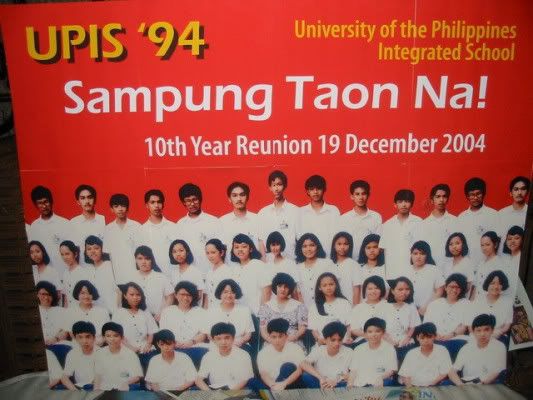
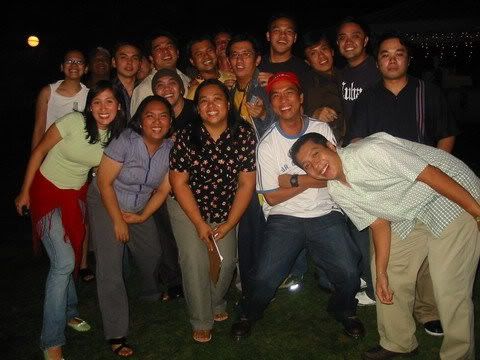
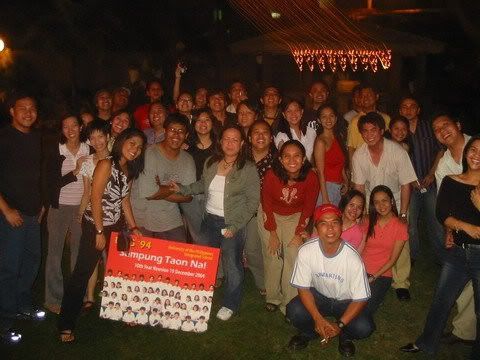
really
 with the way my high school batch turned out. i'm also humbled by the achievements of the people i know from previous and succeeding batches from my old high school. syempre, nakakahiya naman, mga tagapeyups, eh!
with the way my high school batch turned out. i'm also humbled by the achievements of the people i know from previous and succeeding batches from my old high school. syempre, nakakahiya naman, mga tagapeyups, eh!  UPIS forever!
UPIS forever!
[ more pix, part 1 ]
chicago, where i live, is always compared to the big apple, "but cleaner." HA! i am one of those mightily irked when city officials and businesses exercise our apparent inferiority complex - by staging our own ball drop, for one, at one of the hyatt towers downtown. sheesh. even anita padilla, the NBC reporter who was sent to the scene, dryly commented, "and there drops the new york city ball. our turn, in 56 minutes. stay tuned."
ahahaha - it's not yet christmas, but i'm already thinking of the new year. we don't compare to california, whose beautiful san francisco and poppy los angeles compete for attention. simple seattle smiles and lets loose firecrackers usually from the space needle. everyone forgets about hawaii when its their turn; and you wonder why they always go, "hey." the new year is four hours old by the time it reaches them.
one hour west of hawaii is another island nation, kiribati, the christmas islands, the first-ever country to greet the new year. they'd have already moved on to january 2.
The second time I lost my home was when I returned to it after the Islamic revolution in 1979. I knew it as soon as I landed in the Tehran airport. I always try to remember the great critic Theodor Adorno's claim that the highest form of morality is to not feel at home in one's own home." That, of course, is what great works of imagination do for us: They make us a little restless, destabilize us, question our preconceived notions and formulas. I have to be grateful, then, to the Islamic Republic of Iran for making me pose myself as a question mark, for not making home feel like home. - From "The Republic of the Imagination: In which the author of Reading Lolita in Tehran dreams of a better world through literature," by Azar Nafisi. The Washington Post, Dec. 5, 2004. Page BW10. [ full text ]
when a new supervisor from new york city took the cubicle across from me, i immediately changed most of my attitudes at work - dressed more in black, less in khakis, picked up assignments sharper. everyone in the office perked up when she was around - more ties, more heels, more yelling and trading information more efficiently.
like most offices whose headquarters are in new york city, we mark the nyc office, note the fun ones, avoid the strange ones, and harbor grudges against the entire nyc staff, down to the technicians. in my office, at least, the center of the midwest, i have tenderer feelings for the technicians in good ol' kansas city, missouri, than the frazzled-sounding goofy graphics designers two floors down ap editorial hq. you always hold on to the things that you know, and the nyc office, especially since they've uprooted from 50 rock(efeller center) to some 32nd street or other and had softened to their colleagues elsewhere in the world, still deserve some level of "eh? what do you want now?"
after about three months, the new supervisor finally relaxed, looked up from her workstation, and noticed humans all about her. she marked my phone quirks and cracked blanket jokes, "are you all snappy coz you're wearing black? people in new york are like that." ah, the new person with the high rank is settling in.
maybe the difference between imagined nyc mystique and chicago cheerfulness isn't so different to them, because they've lived in this country all their lives. for most immigrants, the change is so drastic that sometimes they never recover. i know when i return home, quezon city's moved so far along ahead of me, i'll have to play catch up. it's a viscious unfairness that the city will have to keep on asserting, because she knows i left a waiting life in chicago, and i won't be staying for long.
ehehehe. fun. :wink:
the history channel had just concluded a feature on this lost monarchy that succumbed to u.s. control around the turn of the 20th century. by 1898, palace state rooms were divided into smaller offices and the rich hardwood walls painted a cheap green color. iolani palace's china, silverware, crystal, jewels, fabrics, furniture, clocks, clothes and other treasures scattered around the world after a 10-year auction that concluded in 1903. auctioneers kept no records of the proceedings.
a pair of paintings from the 17th century were recovered by john loring, a tiffancy & co. executive while visiting a remote woodworker's house in ireland. loring recognized the paintings after visiting one of the hawaiian palaces a year before. the woodworker said loring must be mistaken; the painting featured a dark man in 17th century european-style soldier uniform; a second painting featured a woman in a white gown. they were sold to him by gypsies, the woodworker said. loring recovered them after paying $1,400 for the woodworker's 18th century bricks for his new house.
iolani palace was built in 1882 and is currently the center for a growing nationalistic movement in hawaii. the hawaiian monarchy collapsed in 1893, shortly after the feudal system was abolished. queen liliuokalani was replaced by a provisional government that answered to the white house in washington d.c.
the movement has a volunteer research corps who go through newspapers and what little government records still existing to recover royal items sold at auction. they are part of the team trying to piece together how queen liliuokalani's polynesian heritage but european lifestyle, the stereotypical hula dances, the tempestuous goddesses, the towering volcanoes and black volcanic earth fit into the identity that is hawaiian.
soul?
From "The Republic of the Imagination: In which the author of Reading Lolita in Tehran dreams of a better world through literature," by Azar Nafisi.
The Washington Post, Dec. 5, 2004. Page BW10.
[ full text: ]
In this day and age when politics are paramount, belligerence the order of the day, and questions of culture take second seat to power, I'd like to propose that there is such a thing as the Republic of the Imagination. It is a country worth building, a state with a future, a place where we can truly know freedom.
Let's call it Nabokov's "somehow, somewhere" ; a world that runs parallel to the real one. The key is an open mind, the restless desire to know, the indefinable urge to leave the mundane behind. We write and read not because we already know, not in order to reassert habits and expectations, but because we are in search of what we don't know, of what is dangerously new, unpredictable.
Curiosity is essential. No amount of moral preaching or political correctness can replace what the imagination gives us when it places us in other people's experiences, opening our eyes to vistas and views we never knew existed. It is this process of dehabitualization, of discovering the magic in what another person might consider mundane, that presents the world anew, washed and clear, evoking that sense of ecstasy that only a great work of the imagination can provide.
Now, in this holiday season, I celebrate this country, a place I visited often in my imagination before I visited it in reality, among a people with whom I share much, including a universal language that defies all boundaries This real and actual America on whose soil I stand will always be linked in my heart and mind to another magical America discovered through the sorcery of imagination, in fiction: F. Scott Fitzgerald, Toni Morrison, Cynthia Ozick, Saul Bellow, Mark Twain, Henry James, Zora Neale Hurston, Philip Roth Emily Dickinson, William Carlos Williams, Nathanael West, Ralph Ellison. This land and its extraordinary literary heritage remind me once again how heavily real democracy depends on what we could call a democratic imagination.
I have written about how Nabokov's Lolita came to mean something in Iran, a country defined by its own literary masters: Hafiz, Rumi, Khayam, Ferdowsi. I would like to share with you how, through my experiences, I came to see ways that the imagination connects cultures and realities, how I learned that my Tehran can be linked to Washington.
Like many before me, I became obsessed with the idea of homeonce it was taken away from me. At the age of 13, I suddenly realized that the unique blue of the sky, the particular slant of the light on the snow-capped mountains and trees, the colors of earth and sky at different seasons and different times of the day, certain smells and, most important, the language called Persian, so evasive and yet so intimate made up that vague yet cherished entity I called home. All this was taken away from me when I was sent to a town in England named Lancaster, with its grey skies and constant rain, without mountains and without sun. That was when I realized how close and yet how elusive home is, and how easily lost. All that I had left of home were my memories and the language, the portable world I could carry.
I made peace with my new home in England and later in America through its generous and magical language. The first Shakespeare play I read was "Much Ado About Nothing," and I can still feel the thrill of his words in my spine I cannot tell you much about the experience, except that it was real; indeed, it was transforming. Decades later, the same thrill visited me when my daughter, Negar; almost the same age I was then, herself in her second year of exile ; came home excited, almost shouting, "Mom! Listen to these words!" She read me an obscure line from "Romeo and Juliet": "She's too fair she's too wise, she's too wisely fair." And two thoughts ran through my mind almost simultaneously: Being too wise and too wisely fair, Rosalind was right to be forgotten, and Juliet, risking the madness of love, right to gain immortality. My second thought was: Thank God, my daughter is going to be okay. She has found her new home!
The second time I lost my home was when I returned to it after the Islamic revolution in 1979. I knew it as soon as I landed in the Tehran airport. I always try to remember the great critic Theodor Adorno's claim that the highest form of morality is to not feel at home in one's own home." That, of course, is what great works of imagination do for us: They make us a little restless, destabilize us, question our preconceived notions and formulas. I have to be grateful, then, to the Islamic Republic of Iran for making me pose myself as a question mark, for not making home feel like home.
I also have to thank the Islamist regime for making me realize how fragile were the rights and values I had come to take for granted. Suddenly a new regime had established itself, taking hold of my country, my religion, my traditions, and claiming that the way I looked, the way I acted ; what I believed in and desired as a human being, as a woman, a writer and teacher — were all alien. I was told that I did not belong, that I was a figment of Western imperialists' imaginations.
In the fall of 1979, I was teaching two great American works, Huckleberry Finn and The Great Gatsby, at the University of Tehran without realizing the irony that, in the yard below, Islamists were shouting "Death to America!" and that, a few streets away, the U.S. embassy was under siege by a group claiming to be following the path of the Imam. The new regime was leading a bloody crusade against Western imperialism, against the rights of women and minorities, against cultural and individual freedom. This time I had lost my connections to that other home, to the America in which I had learned to love Henry James, Richard Wright, William Faulkner, Peter Taylor and Eudora Welty.
The main targets of the new regime were anything that indicated difference and diversity. The regime claimed that the sharia laws it was imposing on Iranian society were justified in that they were restoring a woman's dignity and rescuing her from degrading and dangerous Western ideas. The war on women's rights, human rights and culture became central to the fight against the "Western conspiracy."
Let me remind you: By 1979, at the time of the revolution, women were active in all areas of life in Iran. The number of girls attending schools was on the rise. The number of female candidates for universities had risen sevenfold during the first half of the 1970s. Women were scholars, police officers, judges, pilots and engineers — active in every field except the clergy. In 1978, 333 of 1,660 candidates for local councils were women. Twenty-two were elected to Parliament, two to the Senate. There was one female cabinet minister, one governor, one ambassador, five mayors. The majority of Iranians had come to the streets desiring more rights, never dreaming they would be told to give up rights they already had. And for a long time during that revolution, Iranian women poured into the streets of Tehran, protesting the implementation of the new laws.
Before then, women who wore the veil, like my own grandmother, had done so because of their personal beliefs; other faithful Muslims, like my mother, who had chosen not to wear the veil, were now branded as infidels. The veil ceased to represent religion and began to represent the state. Other freedoms were gradually curtailed, and the assaults continued: attacks on freedom of the press; the censorship of books; a ban on dancing, on female singers, on most forms of music, on films and other forms of art, followed by systematic attacks against intellectuals who protested these forms of oppression. Ophelia was cut from "Hamlet." Olive Oyl was excised from Popeye."
The result was that ordinary Iranian citizens, men and women alike began to feel the state in their private, daily affairs. People were flogged and jailed for wearing nail polish, Reebok shoes, lipstick. The fatwa against Salman Rushdie was precisely aimed against the dangers of imagination. The message was that totalitarian mindsets cannot tolerate any form of irony, ambiguity or irreverence. As Carlos Fuentes declared, Ayatollah Ruhollah Khomeini had issued a fatwa not just against one writer but against the democratic form of the novel, which frames a multiplicity of voices, opposing perspectives, active dialogue. What more dangerous subversion can there be than this democracy of voices?
Now perhaps you can understand why reading Lolita in Tehran took on so much significance.
Like any guardians of morality, the Powers That Be took umbrage at Lolita and Madame Bovary, calling them corrupting: These books set bad examples for readers, they said, inciting them to commit immoral acts. Like all totalitarians, they could not differentiate between reality and imagination, and they attempted to impose their own version of truth upon life and fiction. They couldn't see what should be absolutely clear to those who have free minds: We do not read Lolita to learn about pedophilia. We do not read Moby-Dick to learn how to hunt whales. We do not decide to live in trees after reading Italo Calvino's The Baron in the Trees. We do not learn about fishing from The Old Man and the Sea. We read for the pure, sensual and unadulterated pleasure of reading. Our reward is the discovery of the many layers within these works that do not merely reflect reality: They reveal the truth.
I have often asked myself: How is it that under the worst political and social conditions, during war and revolution, in jails and in concentration camps, most victims turn toward works of imagination? I remember, almost a decade ago, listening to a former student, who was newly released from jail, telling me that she and one of her cellmates, another former student, kept their spirits up by exchanging stories about their class discussions, about the books they read, about Henry James and Scott Fitzgerald. At the end of her story, my student informed me that she had been luckier than her friend, who had been executed shortly before her release. Since then I have been haunted by the idea of the places to which these beloved books have traveled — from the warmth of their libraries, from the vivid conversations of classrooms, to the dark cells of executioners.
We know that fiction does not save us from torture or the brutality of tyrannical regimes, or from the banalities and cruelties of life itself. Henry James did not save my student's luckless friend from her untimely death. But we do know that, when confronted by utter degradation, by confiscation of all that gives life its individual worth and integrity, many instinctively go to the highest achievements of mankind, to works that appeal to our sense of beauty, memory, harmony — those that celebrate what is humane, those that we consider original works of the imagination.
You might say that such works gain added significance in a country deprived of its basic freedoms, but they do not matter much here, not in a free and democratic country. How relevant are Fitzgerald, Twain and Flannery O'Connor you might ask, to our lives in Washington, D.C.?
I would respond by reminding you of a passage in Huckleberry Finn in which Huck contemplates whether or not he should give up Jim. Huck knows that, had he gone to Sunday school, "they'd a learnt you there that people that acts as I'd been" ; letting a slave go free ; "goes to ever lasting fire." But his heart rebels against the threats of those "moral" authorities. He sees Jim before his mind's eye in "day and nighttime, sometimes moonlight, sometimes storms, and we a floating along, talking and singing and laughing. But somehow I couldn't seem to strike no places to harden me against him, but only the other kind." When he remembers Jim's friendship and warmth, and imagines him not as a slave but as a human being, he decides: "All right, then, I'll go to hell." He never contemplates "reforming" and decides to free Jim from slavery again.
In American fiction, Huck has many unlikely fellow travelers: the gentle and genteel women of Henry James, the restless and haunted women of Zora Neale Hurston and Toni Morrison, the dreamers like Fitzgerald's Gatsby, and they all decide that they would rather give up heaven and risk hell in order to follow the dictates of their hearts and consciences. They combine a heartbreaking blend of courage and vulnerability that defies easy answers, smug formulas, simplistic solutions. How many of us today would give up Sunday school heaven for the kind of hell that Huck ultimately chose?
As Saul Bellow reminds us, a culture that has lost its poetry and its soul is a culture that faces death. And death does not always come in the image of totalitarian rulers who belong to distant countries; it lives among us, in different guises, not as enemy but as friend. To mistake sound bites for deep thought, politics for action, reality shows for creative entertainment; to forget the value of dreams; to lose the ability to imagine a violent death in Darfur, in Afghanistan, in Iraq; to look at this as passing news: Are these not indications that now — more than ever ; we need the courage and integrity, the faith, vision and dreams that these books instilled in us? Is this not a good time to worry with Bellow's hero in The Dean's December about what will happen if a country loses its poetry and soul?
We need to write about this. We need to recount what happens to us and to others when we strive to save ourselves from despair, to remind ourselves that tyrants cannot confiscate what we value most. The zealots may come in many garbs; they may rail and kill and mutilate in the name of progress or of God. But they cannot rob us of our ideals. They cannot take away our essential humanity.
As Calvino once said, "We can liberate ourselves only if we liberate others, for this is the sine qua non of one's own liberation. There must be fidelity to a goal, and purity of heart, values fundamental to salvation and triumph. And then he added a simple sentence, which, for me, summarizes everything: There must also be beauty."
It is in just such notions ; in a purely human insistence on beauty, in our reveling in ideas, in the storied details of who we are, what we fear, what we wish for ; that the human imagination thrives.
Too often we conclude that we are practical creatures, essentially political animals. But in us there is a far greater impulse ; a longing for the universal, a desire for a shared humanity. It is in that leap toward middle ground that we move toward what truly binds us: toward culture, toward stories, toward language. And it is here, in the republic of the imagination that we are most humane.
___________________
Azar Nafisi is a professor of international studies at Johns Hopkins University and author of Reading Lolita in Tehran. She is also director of the Dialogue Project, an organization dedicated to bridging the divide between Muslims and non-Muslims.

i haven't started really looking yet, and i refuse to be crushed in the stores right now. but i heard these are hot tickets and scarcer than tumbleweeds on lake michigan.
item #2

their fan newsletter propaganda finally snail mailed their subscribers a cool card with a special number for exclusive access to places hidden on their web site. gotta remember to give homage to the gods
item #3


if you can find me either one of these, i will owe you all my herds and property, and a thousand coupons for cups of coffee. no, i will. the coffee, i mean.

more soon
---
Jan. 10, 10:35 p.m.
Asians in America article: The Cambodian American Heritage Museum: Remembering the Killing Fields
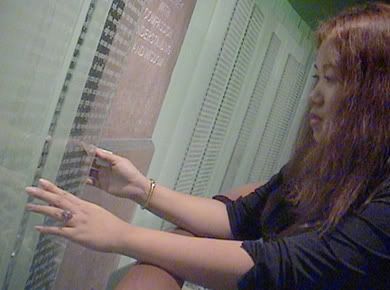
Across the Lawrence Avenue bridge over the Chicago River, artisans for the Cambodian Association of Illinois carved a Buddhist goddess on its headquarter's facade. Upon entrance, the visitor is greeted with soft lights over photographs of children, photographs of newly-arrived Cambodians in their first winter coats and hats, photographs of whole families shuffled from one camp to another.
The Cambodian American Heritage Museum and Killing Fields Memorial tells of an oppressive regime that destroyed the morale and culture of a people. There are four sets of iron ankle braces and a photograph of how they were used to hang two prisoners from the ceiling. Two ancient prayer books in Khmer script, made of palm leaves. An airline shopping bag full of immigration papers and airline tickets, showing they fled into Thailand, later to the Philippines, later to the United States.
Further into the space is a curved divider protecting 80 glass columns under soft light on risers. In the center is a granite wall, etched with a lotus flower in mother-of-pearl, and the words, "We countinue our journey with compassion, understanding and wisdom."
The names of 25,000 victims are carved in Khmer script on each glass column. Kathy Reun, CAI Family Strengthening Counselor, reached for one of the green columns. "I might find my mother's sister's name here. My whole immediate family suvived," she humbly said. [ more ]
still, because lila rodriguez, a lead character, said '208 margarita street is where i learned how to share my toys... pick up after myself... my heart is mexican,' everyone must see it.

on the web:
a day without a mexican
incomplete parody has its moments
i knew that. ya. i know that now. the day we moved her story on the wire was the day yasser arafat died. really died, not killed off by some multimillion media company. the way we did - once.
they said she didn't stay a year. "the good ones never really stay for very long," my colleague said, and we all laughed.
remarkably, in this office, my or chang's behavior doesn't really reflect on asian americans as a whole. rather than blanket all of us, my office labels each of us. "that was an ulanmaya piece." "ulanmaya made the call."
still, it wouldn't hurt to live up to some standards.
on the web:
official web site of iris chang
people hovered over something large, overturned, its engine wide open. it would have been burgundy. a jeep. it was an overturned SUV, and civilians were making sure whoever was inside... well, what can you tell someone trapped and immobile inside a wreckage.
it wasn't an air conditioner unit fallen from the top of our building, landed atop someone, now pinned to the ground. it was an upturned SUV.
my next thought was that where was the other car that did this to them? a cab, burgundy, slammed into one of our building's large black planters, dislodged it. its white air bags deflated like wilted balloons.
"they said they were on their way," a woman said to someone else. she meant emergency, 911.
i called 911 anyways. my voice was shaking, but i attributed it to the freezing december cold. it was cold. "i'd like to report an accident on madison and wacker drive?"
"let me transfer you to the fire department."
fire department? "chicago fire department."
"i'd like to report an accident on madison and wacker drive?"
"they're on their way, don't move anyone that's injured," the dispatcher clipped.
as if i knew the first thing to do in this type situation. "ok. thank you."
a little boy's cry. i turned and there was a large man who carried the boy in his arms. he turned, and there glistened the right of his face and white shirt in red blood. someone was telling him where to turn to get help. he disappeared into a black car. a woman hovered hear the destroyed SUV, she put her giftwrapped packages on the lacerated bumper. i wondered, why would you do that? would your packages be safest nearest the center of a disaster?
a couple cab drivers panicked. i couldn't understand their english through their thick african accents. something about complaining that it wasn't his fault. a sharp piece of his bumper, upturned - lots of pieces of his bumper and the nose of his car. everywhere.
i turned to get away, i wondered, is this a story? one person in the SUV they're still talking to, one man whose face was hurt, one little boy. i stood there. i never realized you could drive so fast in so tight an intersection. i turned again to get away, but i saw drops of blood on the concrete. i turned back and marched past the ruined taxi.
i was late for work. i wanted to wait around, i wanted to leave, i wanted to make sure there wasn't any more i can do that the other bystanders hadn't already done. i heard sirens. a chicago fire department ambulance pulled up. i left.
"happened not 10 minutes ago. these cab drivers - can't drive decently," the security guard said, shaking his head while writing and radioing.
there was no way my colleagues would have known about this accident unless i tell them. we sent the outgoing reporter to check it out, since i was already late for my routines. we turned up the police scanner and learned the fire department sent three amubulances. we waited.
the reporter returned with, "spectacular. i can see why you'd be late for work. but it's not a story. no one's killed, two people injured," she said.
"it would look really bizzare if we ignored an accident in our own front yard," our supervisor said.
"it's sexy for broadcast, sexy for pictures. the planter was eight feet from the lobby. i wouldn't even waste a newsminute on it. it happens all the time in the city," the reporter said.
"it will be in the 5 p.m. news," i said. i thought i sounded a little crazy when i said that, all calm and calculating. i didn't want to think what the families might be going through now. i didn't want to think how they'd be able to pay off damages and lawsuits. i didn't want to think about the little boy or why the woman placed her christmas packages on her upturned SUV.
... maybe mtv and all its real world and road rules drama.
... the scifi channel's packaging ursula k leguin's 'earthsea' into a miniseries! the way nbc did unforgettable 'merlin' and tnt adapted remarkable 'the mists of avalon'! *swooooooon*... prematurely for 'earthsea.' *swooooooon*... in retrospect for 'merlin' and 'mists of avalon.'
... my new favorite interior designer is debbie travis! her taste is impeccable, as is her accent, if sometimes she overdesigns. it reminds me of the way i sometimes grind a storytopic to dust, ahahahaha... but she changed her show from the intriguing 'painted house' to in-your-face 'facelift.' ewww. reminds me of the age of us all. ahahahahaha! and with that, the budgets, or lackthereof. *sigh.*
i could only watch only so much of vh1 - just now, they had a commercial for a show of theirs, 'the year that was 04.' showed all the hot people - eminem, destiny's child, usher, black-eyed peas, anna nicole smith, gwen stefani, jennifer lopez.
i was scintillated while their images flickered onscreen, but after the 30-second spot, all i could think was, 'people pay to see this? so empty.' the scintilla seem so unsure of themselves, too polite to tell the vh1 vj, "what do you want from me?" sometimes too dumb to tell the difference, or maybe i'm just too naive to tell.
i didn't want to analyze any further because they entertain me when they perform, live supposedly, at the award shows. i threw back my blanket and hit a little red button on my remote. the chatty box went dark.
---
** - i was joking.
i've only recently remembered where i used to see that type stripes and color combinations - in my elder ate cousins, the ones who got it made with the beautiful long hair and the glizy jobs overseas.
eww. it made me feel so old - there is a reason why threads from lacoste cost so much. you purchase them coz you belong to a certain economic strata, a strata i totally refuse to belong to, and until i find justice in shelling out $125 for a sweater on sale, i shouldn't.
eh. i bought the sweater anyways, i liked its feel, the colors, and it reminded me of simpler times. maybe someday when things aren't so dire, i'll wear it.
other people keep jewelry boxes - i collect things. my media, my clothes, the silly paris balloon cup from las vegas. it stands out like a lost blue pimple atop the clothes chest where rests my lacoste thread. all reminders of now, when things aren't yet so dire.
supervisor 1: where is fontbonne?
ulanmaya: missouri.
supervisor 2: ulanmaya, are you screwing up genders?
ulanmaya: no! (afterthought.) states!
supervisor 1 and ulanmaya laugh and twirl in their office seats.

sometimes at twilight, midway into my workday nightshift, my brain takes a break, like, it bounces out of my skull and skips its merry way to the lakefront where the wind and the water combined are about 30 degrees farenheit. it doesn't mind at all that it's late fall and it might freeze to death. *shrugs.* i let it. my skull can use a little... airhead time.
empty now, i bob my head to the closing credits of 'the last texan.' kinna seems like the latest offshoot of 'cowboy bebop' and 'trigun,' the man with the three guns. japanime techno is sweet harmony. i wonder if all anime dubbed american will always be derived from some reworked urban legend or other, perhaps from some dream that everything and everyone really is an island and the seas have dried so that all walking is now across desert.
the new desert is a terraformed mars, a wasted earth, a blisterless wilderness where towns are separated by a day's 60 mph drive or a weekend's walk. and in that journey, your skin never darkens, your face never ages, you stay exactly the way you were from origins to dusk. liquid to water your salons, your pubs, your bars has retreated deep under the sand, its access near-impossible, its price inestimable. with no seas to part us, it is a mystery anyone still goes on.
ah, here comes a-hoppin' my brain. time to retread quick, repetitive reality.
 oh, i hope they do not let me down with their second CD. i mean, their second CD - not their recent, luminescent DVD. AHAHAHAHAHA. no, i mean luminescent, the real kind, not like glowsticks.
oh, i hope they do not let me down with their second CD. i mean, their second CD - not their recent, luminescent DVD. AHAHAHAHAHA. no, i mean luminescent, the real kind, not like glowsticks.
i crack myself up.
i am not worthy to blog about evanescence. amy lee is god. i worship her voice. her bandmates comprise heaven.
i love their name: evanescence. ooh.
they released a DVD collection of live performances - in europe! impeccable, even in travel taste - kinna like sonicflood, ahahahaha - coz how in the world, hades, the firmament and hallowed halls of one-hit CD wonders can you top the first they released... ahahahaha... but it's dark in the world of goth... anything can happen.

i met with my video arts group today. we're putting together a 40 minute show on migrant issues, and our first meeting was today. i know all you literary types read this blog... thank you... you must be really bored... but thank you, thank you! ahahaha... no really... i know all you literary types read this blog (thank you), so ANY type advice or suggestions will be welcome!
should we start small, with a specific story to illustrate our macrointelligence on economics, globalization, industrialization, assimilation and other -tions and -isms?
St. Theresa's College Manila Foundation is committed to the education of the middle class-lower-middle, middle-middle, upper-middle... Many were middle-class bus riders with middle-class baon... Even among those who became "comfortable," the sensibility has remained essentially middle-class.
Besides, for the survival of this nation, it is imperative that a case for the middle be pursued. For the struggling middle is an endangered specie - earnest but emasculated and emigrating. ... [ more ]
i wish i could tell more, but it's like excommunication and the priesthood for me regarding our plans for this video project - we cut ourselves and signed a blood pact that made us all swear to secrecy. the fastest way to excommunication from the priesthood is to divulge confession details. the surest way to earn marked man status is by breaking an oath formed during a blood pact.
just kidding. ;-P
we are operating on a shoestring budget - read: zero thousands of dollars - we are all in college, gradschool or still in our first jobs out of college, and we are still in the research stage of a 2-year timeline, so it really isn't worth anyone's time to pick on us. a couple friends of ours are heading home to the philippines for family time, shooting and interviewing key people, so any suggestions for people to talk to and methods to telling this huge, ambitious story will help!
 please email
please email
demetrio maguigad - demetrio@videomachete.org
sarah lynn pablo - sarahlynnpablo@gmail.com
jennifer jimenez - jimej@uic.edu
thanks!

adtunes the site totally rocks... it allows the lowly masses to gather online and trade rumors and secrets about the best commercials right now. the latest buzz is the new target ad - no one can find the tune anywhere! the commercial is so new, it's also not at target.com's channel red - i wonder if the web producers have disabled a switch somewhere that prevents users from playing their commercials overnight, so no one can download and rip them apart while the world sleeps, ahahahaha.
target (pronounced tar-SHZAE... ahahahaha, joke), a glorified kmart with a kick-butt ad campaign, has managed to snag the attentions of the coveted 12-40 age group by maximizing the storechain's red target logo and by aggressively releasing a slew of trendy commercials and songtunes. most likely it is the music that will make me break from working and look at the TV - and more often than not, it will be a commercial for a car, the ipod, a photoprinter, the gap, or yes, suprisingly - target. yum!
we covet their tunes before we'll go to their stores - which aren't so bad, ahaha. the stores are actually spacious and the prices reasonable, and stock everything - from books, dvds, cds, school supplies, beddings, fabric, clothes, hardware, electronics. i think the weak part's the house things, like things for the kitchen and bedrooms, ahahaha - they want to make sure they have something for everyone. so it still does feel like a kmart, ahahaha.
i'd totally love to intern for the ad department and learn how they put together their campaigns. they're so effective without reminding us all that we have limited budgets, ahaha. they perfected the skill of commercials as entertainment, ahahahaha.
---
further:
'Let's Lapu-Lapu together,' by Asuncion David Maramba
Commentary published in the Philippine Daily Inquirer, Nov. 6, 2004
'New middle class,' by Manuel L. Quezon III
Commentary published in the Philippine Daily Inquirer, Nov. 7, 2004
---
Kissing colleagues get scrutiny at highest level
By Jean Patteson
Tribune Newspapers: Orlando Sentinel
Published December 1, 2004
As actor Dooley Wilson crooned in Casablanca: "You must remember this, a kiss is just a kiss ..."
But is it?
A photograph that ran on the front page of newspapers across the country last month raises the question: How do we view kissing between colleagues?
The image shows President Bush planting a kiss on the right cheek of National Security Adviser Condoleezza Rice after tapping her for secretary of state. Bush is pictured in profile, looking down at her face. Rice leans toward the president, eyes closed, lips parted.
Was the kiss just a kiss--a spontaneous expression of affection and congratulations? Or was it a breach of protocol? Or a chauvinistic misstep?
No surprise in these divisive times: Opinion is divided. ...
"The only appropriate form of touching between non-intimates is the firm handshake," says Maralee McKee, who owns Orlando-based The Etiquette Answer.
In a way, the photograph of Bush kissing Rice is unfair, McKee says. It captures a fleeting moment and freezes it forever, turning a peck on the cheek into an everlasting smooch.
"It really wasn't that intimate," McKee says. "Remember, it happened in public, in a room full of photographers. They weren't trying to hide it.
"But there's always the possibility it will be misunderstood. Especially in a political arena, where opponents are always looking for openings to bash the other guy." [ more ]
he offered the last of it to our overnight staffer and mentioned a traditional estonian dish called blood sausage. he has no adjectives for it, "it's just so... oh..." and his eyes widen and he shakes his head. he says it's a sausage filled with meat and, well, blood.
i'm curious about the dish now, but to save us from mocking his ancestry, he says he won't bring any, ahaha. here's a recipe:
Blood sausage
1250 g barley grouts
750 g meat (bacon)
200 g onions
salt, pepper
marjoram, oregano, caraway
½ l blood
about 10 metres intestines
Put washed grouts into hot salted water and boil to half-soft. Cut bacon into little pieces and fry it with sliced onion until they are light yellow, add to the grouts and boil until the mixture is soft. Let the mixture cool and add blood and seasoning. Fill the intestines with the mixture but not hard because blood and grouts swell when the sausages boil. Tie the ends of the sausages with soft string. Put the sausages into lukewarm water and boil them slowly for about 30 minutes. Cool the ready sausages quickly down and keep them in a cold place. Bake or fry before serving. Before frying, put the sausages into warm water. Serve with fried bacon, cowberry or cranberry jam or pumpkin salad.
An older tradition of Estonians was to make white sausage; later blood sausage became popular. White sausage has the same ingredients, except for blood. [ more ]
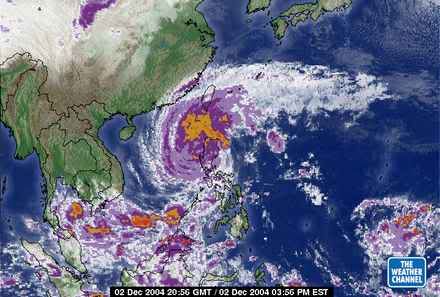
so i look at this weather map and this big cloud jumps out at me, "mwahahahaha!" she sounded like ursula from 'the little mermaid.' i realize that the hurricane's actually a HE, signal number four out of four levels they said, and all i could think of is, "so that's why she has such a guy-sounding low voice. the hurricane's a guy!" and then i wondered if hurricanes swirled in place for a while, sucking up all the frogs in that area to dump in another, when i thought, "it turns this way, right?" meaning counterclockwise, and i went, "cool, i still remember third grade weather science." it seemed fine at that time to trace the hurricane's path, knowing i'd meet my country and her thousand pleasant thoughts along the way, but the closer i got to the equator, a stunning thought greeted me: clouds over malaysia, and much of oceania. and then it hit me, quezon province and 340 swept away, stories from bloggers about the wind, eerily powerful, associated with raging storms and black skies, only now it's just the wind; the sometimes forceful unwieldy way that it blows between damen and cudahy science halls at loyola university's lakeshore campus, blows sometimes so that it feels like you're negotiating sanctions, fighting terms, chiseling deals, finding recompense and, looking at that weather photograph taken several million feet from the earth by a cold satellite in space, frilly i wondered, "where's my country?!"
Current Conditions for Manila, RP
Light Rain
Temperature: 77°F, feels like 82°F
Wind: From the South at 5 mph
[ weather.com ]
[ typhoon2000.ph ]
he gave successor brian williams advice, "Don't pay any attention to the media writers... You have to define yourself to the audience and the way you do that is by putting your head down and doing the work."
dan rather of cbs and peter jennings of abc have also announced their retirements.
for most disciplines, changes offer the successor a chance to seize limelight and shine. in journalism, if media critics resort to shaking the studios to fish for something to write about, the networks would have transitioned correctly.
ahaha, yes, that sounded strange. but maybe a joke would help - a company t-shirt says, "there are only two objects in the world that can bring light to all places: god in heaven and the associated press." if you found that funny, then i won't have to explain. ahaha.






